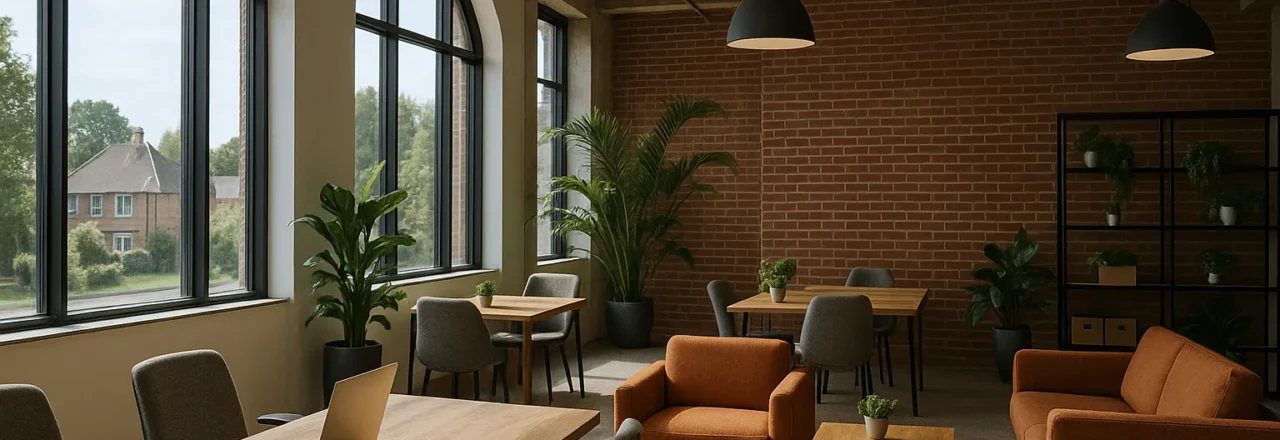The pandemic redefined how and where we work. Once dominated by city-centre skyscrapers and long commutes, the UK’s professional landscape is now shifting toward flexibility, community, and locality. At the heart of this transformation is the rapid growth of regional coworking hubs—spaces that bring together entrepreneurs, freelancers, and remote workers in vibrant local ecosystems outside the capital.
Coworking spaces, once seen as a luxury for urban startups, are now essential infrastructure in towns and smaller cities across the UK. These flexible work environments offer more than just desks and Wi-Fi—they provide collaboration, innovation, and much-needed connection for professionals navigating a post-pandemic world.
Escaping the Home Office: The Need for Local Flexibility
For many remote workers, the early excitement of working from home faded quickly. The blurred lines between personal and professional life, combined with social isolation, led to dips in productivity and mental wellbeing. That’s where regional coworking stepped in.
Take The Hive in Shrewsbury, for example. What started as a small creative workspace has evolved into a bustling hub for writers, designers, and tech consultants. Local web developer James, once struggling with motivation at home, now credits his coworking environment for his productivity boost and renewed creativity. “Being around others who are building, hustling, and creating has helped me stay focused and inspired,” he says.
The Community Factor: Local Support That Fuels Growth
Coworking spaces for rent in regional areas are doing more than just filling vacant commercial property—they’re becoming central to local business support. From hosting networking events to offering mentorship programs and shared resources, these spaces act as innovation hubs that drive small business growth.
In Newcastle, TusPark operates as a full-service incubator, providing startups with access to funding opportunities, workshops, and tailored support. A health-tech startup launched here during lockdowns has since scaled internationally, thanks in part to the collaboration and community it found within the space.
Adapting to Hybrid Work and Post-Pandemic Realities
Today’s workforce demands flexibility—not just in hours, but in location. Hybrid work models are now the norm, and regional coworking spaces offer the perfect solution for professionals who want structure without the stress of city-centre travel.
These spaces have also responded to social distancing adaptations by rethinking layouts, implementing booking systems for shared spaces, and investing in improved ventilation and hygiene protocols. Some even offer private pods and virtual office services for those needing a blend of autonomy and connection.
From Isolation to Inspiration: Mental Health and Belonging
One of the most powerful impacts of coworking is the sense of belonging it fosters. For freelancers and solo entrepreneurs, regional hubs offer a way to combat loneliness and re-engage with a professional network. Events like Friday breakfast meetups, local speaker sessions, and creative workshops turn workspaces into social lifelines.
Take The Guild in Bath—a beautifully restored Georgian townhouse turned coworking community. Freelance marketing consultant Laura recalls how joining gave her more than just a desk. “It’s the people. We share referrals, we talk strategy, and we support each other when things get tough,” she explains. “I didn’t realize how isolated I was until I found my tribe.”
A Catalyst for Innovation and Economic Regeneration
Beyond individual stories, regional coworking hubs contribute significantly to local economies. They attract talent, retain skilled professionals within communities, and reduce reliance on major metropolitan centres. As more companies decentralize and embrace remote hiring, regional coworking offers a cost-effective solution that balances professionalism with accessibility.
This shift is particularly impactful in post-industrial towns and areas undergoing regeneration. Coworking spaces repurpose unused buildings, inject new energy into high streets, and become gathering places for innovation. They’re not just places to work—they’re engines of local progress.
In Summary
The rise of regional coworking hubs marks a significant evolution in how the UK works. No longer confined to London or Manchester, coworking is flourishing in smaller cities and towns, offering flexible, creative, and collaborative environments for the modern professional.
Coworking spaces aren’t just reacting to change—they’re shaping the future of work. By providing affordable office solutions, supporting small business growth, and fostering vibrant professional communities, these hubs prove that work can be both productive and personal—no matter the postcode.
Whether you’re a remote worker in Devon, a startup founder in Sheffield, or a freelancer tired of the kitchen table in York, there’s likely a regional coworking space ready to welcome you—and help you thrive.

